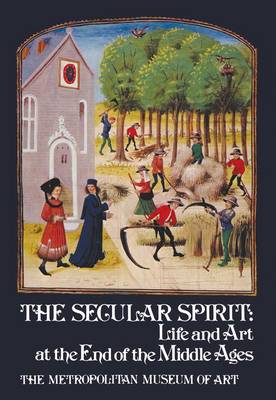In all eras, objects of everyday life are taken for granted: they are used and discarded, rarely dicussed or preserved. It is, generally, a period's extraordinary works of art and architecture that have been preserved for our examination, rather than the pots, games, and other ordinary objects. But the focus of this exhibition, The Secular Spirit: Life and Art at the End of the Middle Ages, is on pots and games, clocks and saddles, almanacs and herbals, tools and gifts-a great variety of things made for use during the course of daily life in one of thethe great periods of transition in western Europe, the years between 1300 and 1550. During these two and half centuries of dramatic change, the restrictions and insularity of the feudal system crumbled under economic, social, military, and national upheavals. This period saw the development of capitalism and free enterprise, which gave rise to a wealthy and powerful middle class. It likewise saw the emancipation of the peasant and the expansion of opportunities for the average man to work for his own profit and better his living conditions. The foundations of modern Europe were laid during this period, and many of the legal, economic, and legislative changes survive to this day.
The 320 objects in the publication and exhibition are drawn entirely from collections in North America, many of which at the time were almost unknown. The artifacts range from the most ordinary everyday equipment to pieces that are without question glorious works of art. There are simple cooking vessels and spits, for instance, as well as five tarot cards made as a wedding present for an Italian noblewoman, which are painted with designs as exquisite as those of the finest manuscripts. The varying levels of knowledge are also indicated: a charming though prosaic astrological treatise is shown with an astronomical compendium of astounding sophistication and accuracy. And the arcane manuscripts of the alchemists are presented as well; in one case, the text is still undeciphered.
The catalogue is divided into eight categories of objects covering the gamut of Medieval life: the household; personal adornment; labor, commerce, and travel; learning; science and technology; hunting, gaming, and sports; music and musical instruments; and ceremony and custom. The text is accompanied by many illustrations, mostly in black-and-white but with some in color, an introduction, and selected bibliography. [This book was originally published in 1975 and has gone out of print. This edition is a print-on-demand version of the original book.]
- ISBN10 0300203411
- ISBN13 9780300203417
- Publish Date 3 September 2013
- Publish Status Cancelled
- Publish Country US
- Imprint Metropolitan Museum of Art
- Format Paperback (US Trade)
- Pages 288
- Language English
